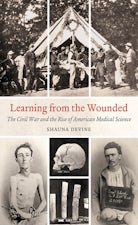Nature's Civil War
Common Soldiers and the Environment in 1862 Virginia
By Kathryn J. Shively
240 pp., 6.125 x 9.25, 4 halftones, 2 maps, 4 graphs, 2 tables, notes, bibl., index
-
Paperback ISBN: 978-1-4696-2649-9
Published: August 2015 -
E-book EPUB ISBN: 978-1-4696-1077-1
Published: November 2013 -
E-book PDF ISBN: 979-8-8908-4357-9
Published: November 2013
Civil War America
Buy this Book
- Paperback $32.50
- E-Book $19.99
For Professors:
Free E-Exam Copies
Awards & distinctions
2014 Wiley-Silver Prize, Center for Civil War Research
2011 Edward M. Coffman Prize, Society for Military History
Meier explores how soldiers forged informal networks of health care based on prewar civilian experience and adopted a universal set of self-care habits, including boiling water, altering camp terrain, eradicating insects, supplementing their diets with fruits and vegetables, constructing protective shelters, and most controversially, straggling. In order to improve their health, soldiers periodically had to adjust their ideas of manliness, class values, and race to the circumstances at hand. While self-care often proved superior to relying upon the inchoate military medical infrastructure, commanders chastised soldiers for testing army discipline, ultimately redrawing the boundaries of informal health care.
About the Author
Kathryn Shively Meier is assistant professor of history at Virginia Commonwealth University.
For more information about Kathryn J. Shively, visit
the
Author
Page.
Reviews
"A captivating 'ethnographic history of soldier health,' building a strong case for environmental determinism, a phenomenon commonly overshadowed by the 'persistent romanticizing' of the Civil War in popular culture. Recommended to Civil War history buffs and anyone interested in soldiers' adaption and survival in trying environments."--Library Journal
"Well written and accessible to undergraduates. . . . Highly recommended. Upper-division undergraduates and above."--Choice
“Meier’s work is well written and is accessible to the general reader.”--Civil War Book Review
“An innovative, fine-grained study that blends military, medical, and environmental history in ways that transform understandings in all three fields.”--Journal of American History
“Will prove a template for other scholars and could, very likely, inspire an entire genre within Civil War studies.”--The Historian
“Offers useful insight into the common soldier’s difficult task of maintaining personal health amid the dual stressors of a harsh natural environment and a system of official army care which seemed a disorganized, uncaring, and frequently incompetent bureaucracy to those used to the loving attentions of home and family.”--Civil War Books and Authors blog
Multimedia & Links
Read: In a guest blog post, Meier describes the struggle of Lt. Charles B. Haydon as he wards off disease during the early years of the Civil War. Read "A Civil War Soldier Beats the Odds on the Virginia Peninsula."
Read: In another guest post, Meier explains that civil war soldiers reported traumas from unexpected sources. Read "Civil War Soldier Trauma in Unexpected Places."



